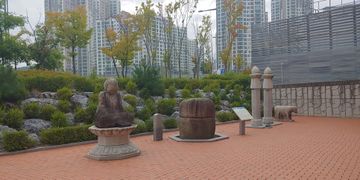태실(석함)
| 태실(석함) |
|
 “대전 가볼만한 곳 –대전시립박물관 특별전시. 행복대전관광안내소, 네이버 블로그, 2019.10.27. |
|
| 대표명칭 | 태실(석함) |
|---|---|
| 한자 | 胎室(石函) |
| 주소 | 대전광역시 유성구 도안대로 398 |
| 지정(등록) 종목 | 문화재자료 제26호 |
| 지정(등록)일 | 1991년 10월 24일 |
| 분류 | 유적건조물/인물사건/인물기념/탄생지 |
| 수량/면적 | 1기 |
| 웹사이트 | 태실(석함), 국가문화유산포털, 문화재청. |
|
|
|
해설문
국문
태실은 왕실에서 자손이 태어나면 그 태(胎)*를 봉안하는 곳이다. 이 태실에는 선조 41(1608년) 선조의 11번째 왕자인 경평군(慶平君) 이륵(李玏)의 태가 안치되었다. 태실은 원래 갑천변 가수원다리 부근에 있던 태봉지 정상에 묻혀 있었다. 태실은 돌로 만든 상자 형태로 몸체와 뚜껑으로 구성되어 있다.
태실의 석함에는 백자 두 개로 된 태항아리(胎甕)와 지석(誌石)**이 들어 있었는데, 1928년경 일제에 의해 경기도 고양 서삼릉(西三陵)으로 옮겨졌다.
- 태: 탯줄
- 지석: 인적 사항을 기록하여 묻은 판석
영문
Placenta Chamber (Stone Chamber)
This stone chamber was made in 1608 to preserve the placenta of Yi Reuk (1600-1673), the 11th son of King Seonjo (r. 1567-1608) of the Joseon dynasty (1392-1910).
A placenta chamber is where a nested jar containing a royal baby's placenta and umbilical cord were enshrined. During the Joseon dynasty (1392-1910), a newborn baby's placenta was regarded as the origin of life, and preserving it would ensure a healthy, advantageous life for the child. Because this was especially important to the royal family, they took great effort to find the most auspicious place and time to build a placenta chamber. This ritual of placenta chamber construction is unique to Korea.
This chamber together with the memorial stone was discovered in 1991 during road construction. It was found buried in a 2.4 m deep pit on a mountain about 6 km away. The chamber contained two jars bearing the placenta (and umbilical cord?).
During the Japanese colonial period (1910-1945), the Japanese authorities relocated most of the Joseon royal family’s placenta jars and destroyed the chambers. This placenta chamber were relocated in 1928 to the West Three Royal Tombs in Goyang.
영문 해설 내용
이 석함은 1608년 조선 선조(재위 1567-1608)의 11번째 아들인 경평군 이륵(1600-1673)의 태를 안치하기 위해 만들어진 것이다.
태실은 조선시대 왕실에서 자녀의 태를 봉안하기 위해 조성한 석실이다. 태는 생명의 근원으로 여겨졌기 때문에, 태아가 출산된 이후에도 함부로 버리지 않고 소중하게 보관하였다. 특히 조선 왕실에서는 왕자나 공주가 태어나면 명당을 물색하고 길일을 가려 태를 봉안하였다. 태실을 세우는 이러한 의식은 한국에 유일하다.
이 석함은 1991년 도로공사를 하던 중 가수원동 인근 산 정상에서 발견되었다. 약 2.4m 깊이의 구덩이에 묻혀 있었으며, 태를 담은 두 개의 항아리와 태어난 연월일 등을 적은 지석이 들어있었다.
태항아리는 일제강점기인 1928년경 일본에 의해 경기도 고양의 서삼릉으로 옮겨졌다.